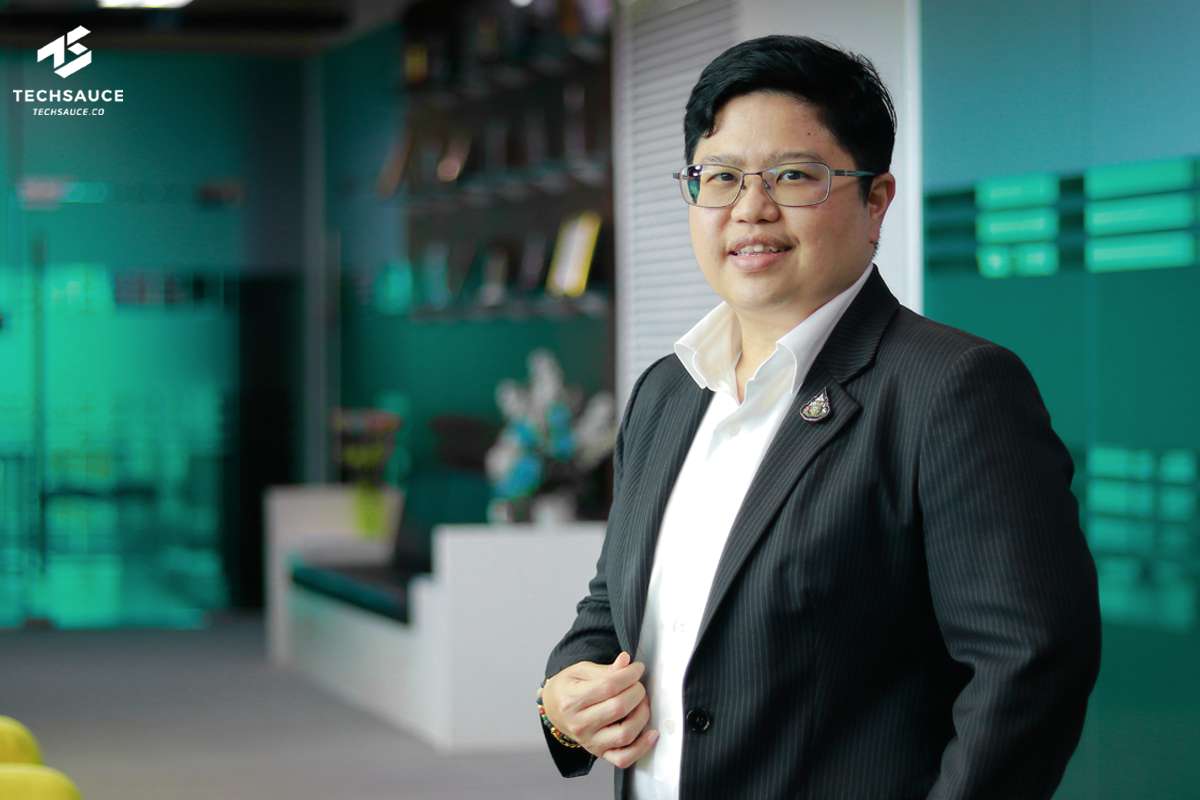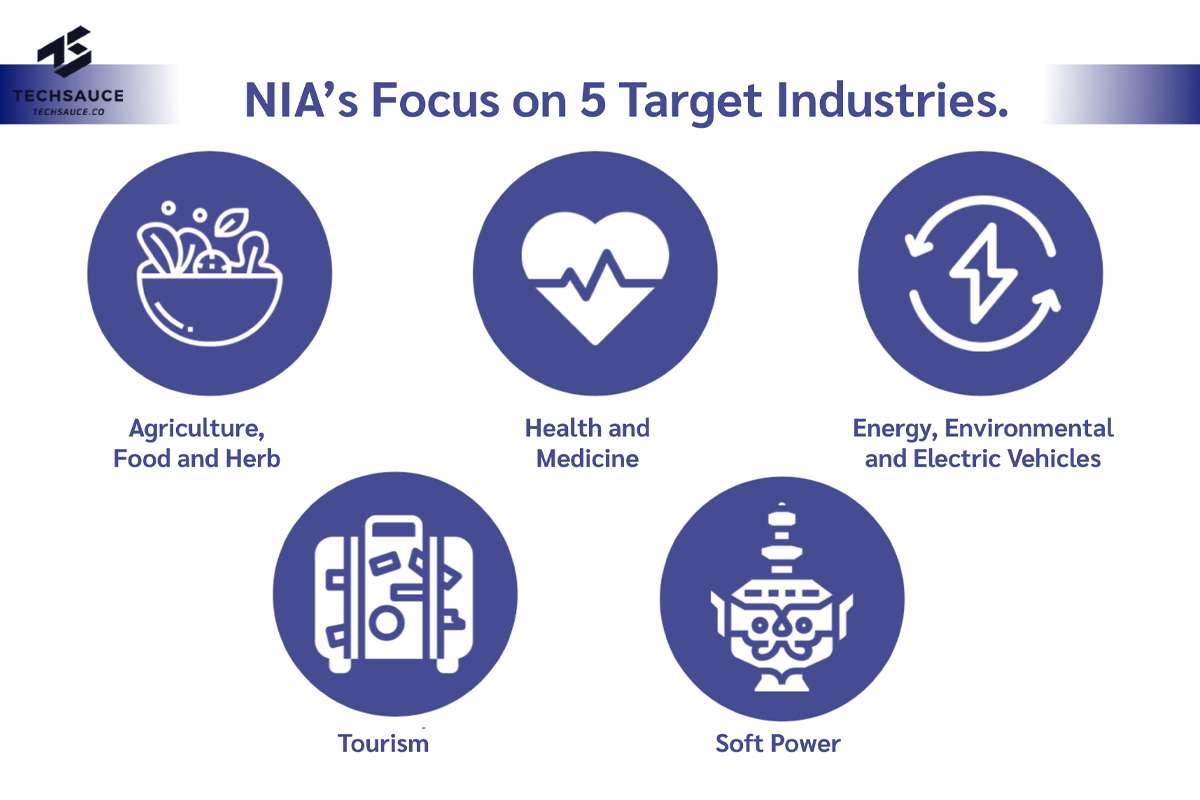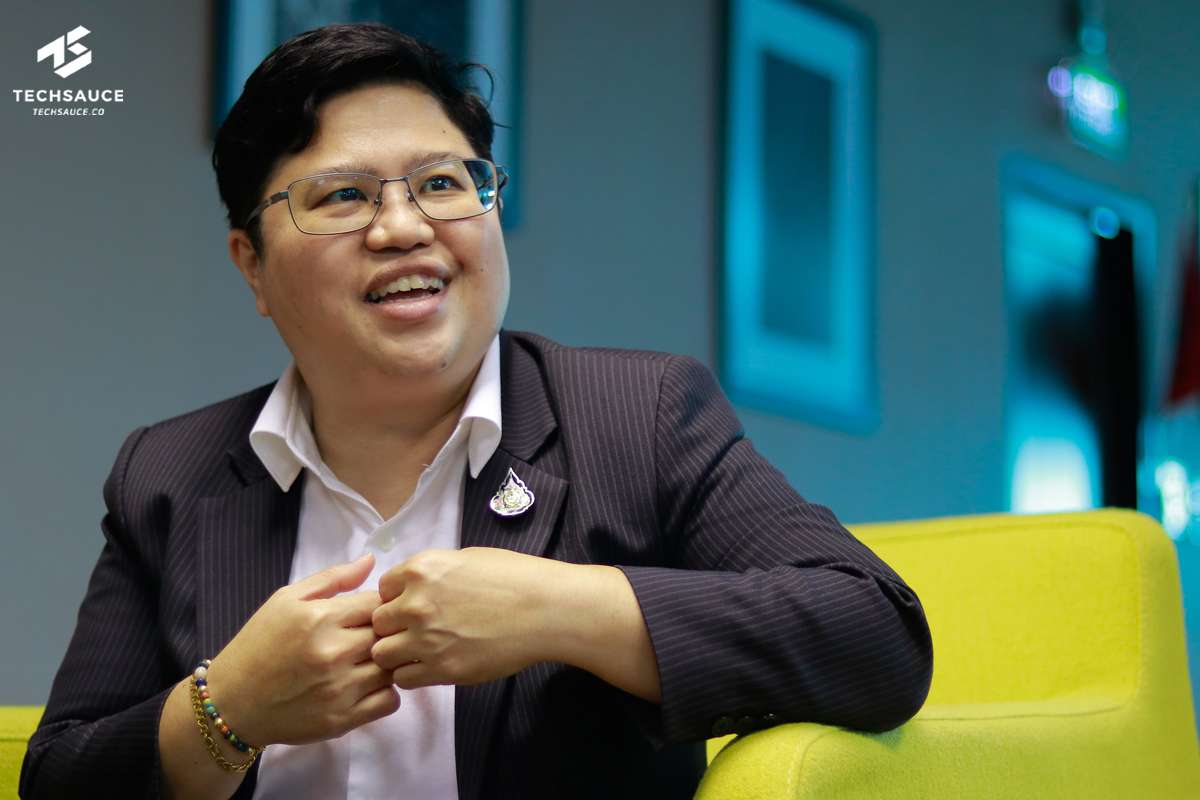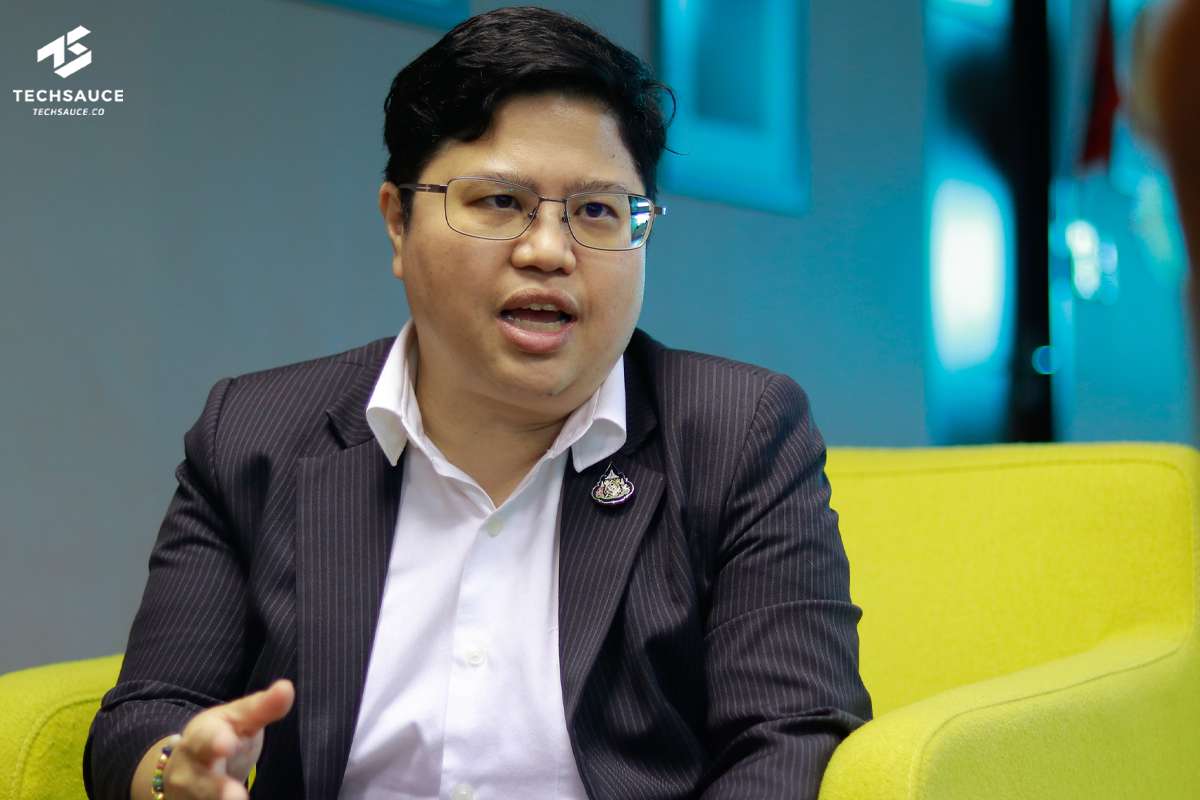Dr. Krithpaka Boonfueng, NIA, Moves Forward to Revitalize the ’Startup Road’ and Provides Clear Guidance for Thai Entrepreneurs.
After three years of fighting COVID-19, we were under a shutdown - no meetings with people, no traveling - and our lives have changed a lot. The situation of startup entrepreneurs was the same during that period. Thai startups in certain industries, such as tourism (TravelTech) and manufacturing, either stagnated, receded, or closed down. At the same time, some startups are experiencing rapid growth due to the increasing number of people living online. This trend is particularly evident in the financial industry (FinTech), education (EdTech), and insurance (InsurTech). Meanwhile, amidst the backdrop of a volatile global economy and a multi-polar war, the future for Thai startups remains uncertain. Dr. Krithpaka Boonfueng, Executive Director of National Innovation Agency (Public Organization) or NIA, explained and pointed out to Thai startups the direction and opportunities on a new path for us in this article.

“From the past situation, many startups have adapted, such as Bellugg, which is a luggage delivery service that has switched to logistic baggage handling, or even an application like QueQ, which is an application for restaurant reservations. When people do not go to restaurants, it has switched to the application for booking vaccination queues to reduce congestion. As you can see, a startup has the advantage of being adaptable, sensitive to change, flexible and agile. Therefore, if a startup survives from three years ago, it will not get any worse than this. It will only be at a point of growth or expansion.”
Disclosure of SME and Startup Support Policy by NIA with Details
The national policy to drive startups can be divided into five categories, which are the target industries that will be driven by NIA from 2024 onwards, and one of them is soft power.

Agriculture, Food & Herb
NIA aims to encourage farmers to “Do less, Get more” by using technology and innovation to help plan cultivation or by using innovation in the production process for quality control of outputs. With an effective method, it will result in better livelihood for farmers or even jointly support the “From Farm to Market” business model, enabling farmers to sell agricultural products and food via applications or platforms like AgTech, FoodTech, and e-Marketplace.
However, the El Niño phenomenon and the impacts of climate change significantly affect the supply and production processes, directly impacting the food business. Consequently, NIA is actively promoting agricultural and food technologies to strengthen food security to be sufficient for both domestic consumption and future exports.
Health and Medicine
The COVID situation is an opportunity for Thai people to start using more online systems, such as MedTech or HealthTech, making online doctor visits available through Telemedicine. This is an important fundamental health technology and innovation that Thai entrepreneurs can use to assist in the livelihood of the elderly in Thai society, as Thailand has entered the aging society. It is also used to help reduce inequalities in access to medical care for people in remote areas, expand services abroad to help the world’s population and generate income back into the country.
Energy, Environmental & Electric Vehicles
It is a group responding to the current world situation, encompassing the use of electric vehicles (EVs) and the reduction of carbon emissions, issues that Thai entrepreneurs need to adapt and adjust to their businesses accordingly. NIA therefore encourages Thai startups to develop energy products or services and promote their exportation. Currently, if goods with environmentally unfriendly production processes are to be exported to Europe, entrepreneurs may form trade barriers (CBAM) and be unable to export such goods. Therefore, NIA, in cooperation with NSTDA, Beacon Venture, KBANK, and related private entities, jointly pushes products that are actively promoting product falling under the category of Energy Tech, Climate Tech
Tourism
Thailand must employ innovation to attract funds from foreign tourists, for example, through the development of applications meeting the needs of tourism and AR/VR technology guiding tourists on activities and destinations within Thailand. Another thing is that modern tourists prefer to do research before traveling to a country. Thus, if there is an innovation that is ready to meet the needs of the travel industry, such as TravelTech, in the form of an application, it will promote the image of Thailand as a more innovative nation in foreigners’ eyes.
Soft Power
In terms of soft power, Dr. Krithpaka clearly said that this aligns with the government’s policy, which requires support from the three main sectors: the private sector, the government and the community. Collaboration among these three sectors is essential.
"For the private sector, we see that many private entities have huge potential. They assess soft power development as a product aiming to export it for overseas sales. For the government sector, it is imperative for the government to help communities and people in develop in products that align with their needs. In this part, NIA has mechanisms ranging from grants, primarily focused on ‘social innovation,’ to funding for those with community goods to enhance products for international export. This is very important in transforming local products into global commodities.
“And the most important thing is the community sector, as the identity of soft power is rooted there. This dimension that requires our primary focus to identify and promote outstanding products created by individuals and communities. When it comes to social innovation, we drive into community enterprises, at the grassroots level, highlighting their strengths. However, we are not going to make them all the same. If they are all the same, we cannot create an identity in each area.”
Dr. Krithpaka took the example of the Manohra costume, which is the intellectual heritage of the South. If you want to buy a Manohra costume as a souvenir, it seems too big. There is an entrepreneur participating in the 'Nil Mangkorn' project to apply for funding to create a selling point by using the individual identities of the Manohra costume to make earrings, pendants, necklaces, and bracelets that can be sold because foreigners like them. In the case of a footballer wearing elephant pants, the pants become very popular. Accordingly, NIA wants to have influencers to promote innovative community products.
“To put it simply, we need to have the flagship products of each area as a main product to promote soft power and then distribute them across the country in a systematic way as to what will be focused on and then elevate them all together. This action will have economic and social impacts.”

NIA’s Startup Support Mechanism and Trends in Supporting Startup Ecosystems of the Current Government
As for the mechanisms to support Thai startups, there are two types: Type 1 involves financial support, including investment, while Type 2 encompasses non-financial support, such as advising, counseling, market search, etc.
In the case of financial support, NIA has allocated a budget of 1,500,000 baht and 5 million baht each. Startups with the potential for a 5 million baht investment belong to the Themetics group, for example, business operators of electric vehicles, energy, food for the future, and sustainable agriculture. These sectors directly align with the government’s policies and respond to the missions outlined by NIA.
The Techsauce Team asked about the trends in promotion of innovation or startups that Prime Minister Srettha Thavisin mentioned.
Dr. Krithpaka said, “The Prime Minister clearly stated that the market leads and innovations support. When the market takes a certain direction, innovation must align to support it. This principle applies across various sectors, from production to soft power without innovation progress would be limited”
In addition, NIA focuses on market innovation to facilitate the expansion of product for innovation entrepreneurs. It plays a crucial role in connecting startups with the appropriate markets, be it large companies or government markets, ensuring that products become more impactful and useful. Furthermore, There is innovation diplomacy involving discussions with Thai embassies abroad and foreign embassies in Thailand armed at supporting innovative products and quality services from Thai entrepreneurs on the international market. NIA also provides business incubation to students from 48 universities across the country through training, coaching and demo days to train the next generation in entrepreneurial skills and spirit.
In terms of the action plan for 2024, the NIA funding mechanism will be adjusted to after incised support to products in more markets. Regarding funding, NIA aims to 'provide more investment' while also focusing on 'using the investment more efficiently.' Another more important issue that will transform Thailand’s startup ecosystem and serve the national agenda is the Startup Act, which is expected to be enacted next year. Currently, NIA and the Office of the Council of State are working on drafting the Act. One notable development is the introduction of more support mechanisms through multilateral collaboration, they are consolidating efforts under a single system to ensure transparency, allowing all parties to track contributions to startups, fund received, and identified barriers, NIA will actively participate in resolving startup-related challenges.
“VC, CVC have continued to invest but are more selective about what they invest. Therefore, when they become more selective, they rarely invest in small businesses and choose to do it where it is going to have an impact. It becomes our job to help small businesses, and it is time for the government to take risks.” Dr. Krithpaka added.

Where are the opportunities for startups and SMEs amidst the EV and AI competition?
Thailand has emerged as a star in ASEAN because many EV brands establish plants, actively engaging in marketing initiatives. So where do Thai startups and SMEs position themselves in this line of business?
Dr. Krithpaka replied honestly, “We may not be able to manufacture the entire car, NIA aims to involve entrepreneurs in the value chain of this product, exploring the various parts they can contribute to. It can be either a charging dock or a charging station. For example, overseas startups produce charging stations with dispensers that can charge EVs faster and better. Many startups have the potential to grow into unicorns. This is why we are actively promoting more engagement.
“AI is a must, and for those developing AI, especially in medicine, you will certainly be eligible for a Thematic fund because it is a major highlight.”
Examples of the success of Thailand’s startups and the NIA’s pride in support
Dr. Krithpaka identifies three startup brands that NIA fosters to grow or are the model for other entrepreneurs, including QueQ, Baiya and MyCloudFulfillment.
“If you were to ask me which brand is in my heart, it would be QueQ. This startup has received funding since the first open innovation round benefiting from our that support mechanism, Good Software, No Interest. Whatever the office fosters, such as booking vaccinations at Bang Sue, Bangkok prepared a letter asking us to take the entrepreneur, and we took QueQ. QueQ is one of the startups that we can proudly say plays a significant role in what drives our country. Another startup called Baiya is a vaccine development company that has been developed by Chulalongkorn University. The last startup that has been developed by us is MyCloudFulfillment, a cloud service provider. We traveled with this startup several times. This startup was also funded by NIA. Now these three companies have received a lot of investment, and can be considered to be in the Thai Startup Ecosystem, and are the pride of NIA.”
Dr. Krithpaka said with a smile and concluded that with a limited government budget, NIA is working with depa to link mechanisms together for seamless collaboration and a reduction in redundancy. If any entrepreneurs are interested in seeking advice or investment, they can contact NIA directly, in particular EVs or others supporting energy.
This article is advertorial.
Sign in to read unlimited free articles





.png)
